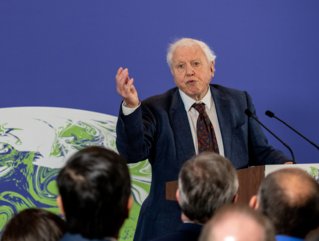Sir David Attenborough: A lifetime of environmental advocacy

Heralded as the greatest broadcaster of our time, David Attenborough’s name is synonymous with environmentalism for many. His career has educated and informed global audiences, highlighting the plight of the natural world to many who would otherwise not have been able to engage with it in such an informative yet emotive way.
In 1945 David Attenborough won a scholarship to study geology and zoology at the prestigious Cambridge University in 1945 and obtained a degree in natural sciences. After his first degree, Attenborough embarked on a career in broadcasting at the BBC, during which time he became known for his environmental broadcasting. He left the BBC in the early 1960s to study a postgraduate degree in social anthropology at the London School of Economics, however returned as BBC2 Controller before he could complete his studies.
Environmental broadcasting
David Attenborough’s ongoing broadcasting career has spanned eight decades. He is widely known for presenting BBC’s Life series, including Life on Earth, The Living Planet, The Private Life of Plants, The Life of Birds, The Life of Mammals, Life in Cold Blood, as well as the Planet Earth series. His work encourages engagement with the wider global environment for anyone with access to a television, and doesn’t shy away from reality.
Alongside his own broadcasting, the Life on Air documentary made by the BBC in 2002 examines the legacy of his first half century of work as part of the series Attenborough in Paradise and Other Personal Voyages. In the same year, a public poll deemed Attenborough to be considered one of the 100 Greatest Britons.
Attenborough is recognised by Guinness World Records as having the longest career as a natural historian and presenter in television, and his broadcasting work has received multiple BAFTAs, Emmys, and other television awards. He was knighted twice, first by Queen Elizabeth II in 1985 and then again by King Charles III in 2022 and, with an incredible 32, has more honorary degrees from British Universities than any other person.
Arguably one of his most prestigious accolades, however, is the Champion of the Earth Lifetime Achievement Award for his dedication to research, documentation, and advocacy for the protection of nature and its restoration, presented to Attenborough by the United Nations Environment Programme in 2022.
Alongside, through his broadcasting work, Attenborough’s legacy is formed by the species and genera — of which there are at least 20, both living and extinct — that have been named after him.
Wider sustainability work
Attenborough’s work outside of broadcasting is both extensive and wide in range. He served as President of the Royal Society for Nature Conservation 1991–1995, and currently sits as President of Butterfly Conservation and President Emeritus of both the Royal Society for Nature Conservation and Leicestershire and Rutland Wildlife Trust. He is the Vice-President of The Conservation Volunteers and Fauna and Flora International, and Ember of Earthshot prize Council. The World Land Trust, Friends of Richmond Park and Population Matters see Attenborugh as a Patron, alongside his role as Honorary Patron of the North American Native Plant Society. He also currently serves on the advisory board of BBC Wildlife magazine and is a Corresponding Member of the Australian Academy of Science.
In 2003 he helped to launch ARKive, a global project to gather together natural history media into a digital library, with a view to prioritise profiles for the 17,000 or so species on the IUCN Red List of Threatened Species. The collection was archived in 2019 at over 100,000 images.
Climate change
Attenborough is a staunch advocate for actions against climate change, using his documentaries to highlight the effects that global warming is having on the planet around us.
“If we have not taken dramatic action within the next decade,” he says in the 2021 series Climate Change – The Facts, “We could face irreversible damage to the natural world and the collapse of our societies.”
In 2021, he was the People’s Advocate at COP26 where he urged world leaders to reduce emissions for the benefit of the planet. “Ultimately the emergency climate comes down to a single number — the concentration of carbon in our atmosphere,” he said in his address. “The changes in that one number is the clearest way to chart our own story, for it defines our relationship with our world.
“We are already in trouble. Today, those who’ve done the least to cause this problem, are being the hardest hit.”
His message is clear, but it is also hopeful: “We must recapture billions of tons of carbon from the air, and fix our sights on keeping one and a half degrees within reach. A new industrial revolution, powered by millions of sustainable innovations, is essential, and is indeed already beginning.”






